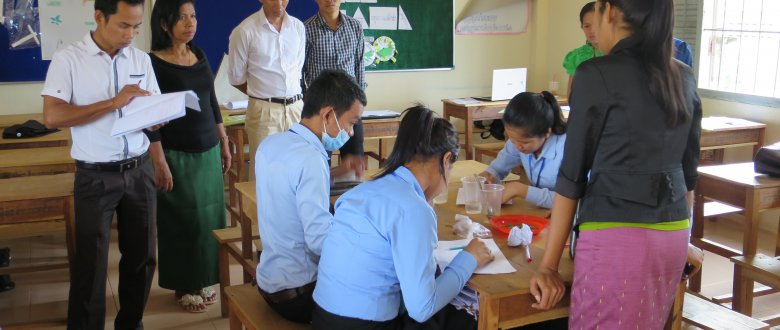
Goal of the external evaluation
The end of the VVOB programme 2014-2016 is in sight and that means that we need to take some time to reflect on the past three years. To do this the Belgian Directorate-General for Development Cooperation (DGD), who is the main financier of the VVOB programmes, organised an external evaluation.
This external evaluation was done for nine educational VVOB programmes, among which the Cambodian MoEYS-VVOB programme. The goal was to get an external appreciation of the programme’s approach and actual results. An external point of view always helps to identify what lessons can be learnt and will formulate recommendations that can be implemented in the future.
The external evaluation focused on five criteria that are internationally endorsed by the Organisation for Economic Co-operation and Development (OECD):
- Relevance
- Efficiency
- Effectiveness
- Impact
- Sustainability
External evaluation process
The external evaluation team consisted of two members, a Cambodian and a French consultant, who submerged themselves into the programme.
Over a period of five days in mid-August the evaluation team had meetings with several VVOB staff members, representatives from UNICEF, VSO, World Bank and UNESCO, our local partners and target groups.
The evaluators travelled to Kampong Cham to visit the Provincial Teacher Training Centre, where they met with the school management. They talked about the programme results and how the manuals and teaching aids are implemented by the mathematics and science teacher trainers. Later they also visited an Anuwat school and a cooperative school, where the student teachers practice during their teacher training, and had a group discussion with model teachers.
The next visit brought them to Siem Reap’s Provincial Teacher Training Centre where they met with the sub-core team for mathematics, the core team for science and the director of the practice school.
First results from the evaluators
During the last day of the external evaluation the entire VVOB Cambodia team received the evaluator’s initial feedback.
The programme scored well on the relevance criterion, which is not surprising since it’s a core strategy for all VVOB programme’s to be embedded in the country’s educational policies and development needs. The evaluators recognised that the programme is demand-driven, co-designed by the local partner and that it draws upon the results of earlier VVOB programmes and other development partners’ work.
Efficiency-wise the evaluators noted that there is a strong coordination between the result areas; in the design of the programme as well as between the coordinators. The programme has a fast paced implementation, a flexible mobilisation of resources and uses its capacities to the fullest. Some drawbacks however are the inevitable translation hiccups (Khmer-English) that can slow the progress down or make the mutual understanding of concepts more difficult. Another recurrent challenge in all intensive cooperative programmes is the alignment of agendas between the local partner and VVOB.
When it comes to effectiveness the programme uses a variety of capacity development methods to reach the defined objectives in the most effective way. Throughout the capacity development activities, constructive feedback is a key principle and training sessions are consequently followed up to ensure and support that the gained knowledge and skills are implemented.
It’s still a bit early to talk about big impact but the evaluators saw that there are a lot of signals that change is happening on the ground. It became visible through the teacher trainers’ motivation when the evaluators consulted them; how they expressed themselves and pointed to their changes in their teaching. The directors of the teacher training centres also shared that they see a diffusion of the gained knowledge by teacher trainers to other subjects beside mathematics and science.
Last but not least, the evaluators had some feedback on the programme’s sustainability. The programme covers a lot of beneficiaries on all levels throughout the organisation, forming a broad base of shared understanding and disseminated low cost materials/tools. Through a robust cascade system crucial actors took on roles and responsibilities that will continue beyond the programme.
Some general recommendations for the future programme are to be more involved and active as a key player during policy debates on education. Also to further explore a deeper level of cooperation with other development partners or NGOs, not only on the level of complementary programmes but actual synergy in objectives.




